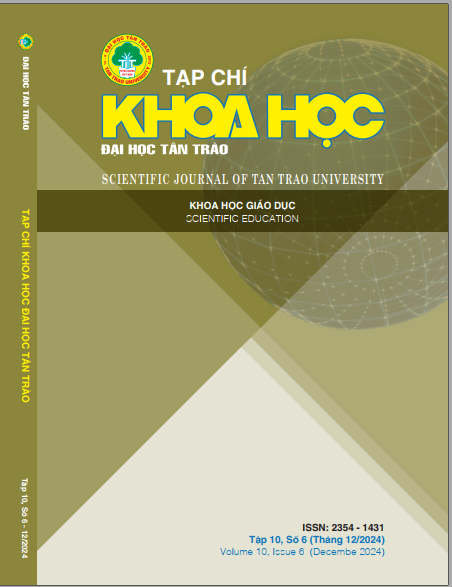ĐÁNH GIÁ ĐÓNG GÓP CỦA CÁC CƠ SỞ GIÁO DỤC ĐẠI HỌC CHI NHÁNH QUỐC TẾ ĐỐI VỚI HỆ SINH THÁI NGHIÊN CỨU VÀ ĐỔI MỚI TẠI CÁC QUỐC GIA ĐANG PHÁT TRIỂN, BAO GỒM CHUYỂN GIAO TRI THỨC, PHÁT TRIỂN CÔNG NGHỆ VÀ HỢP TÁC VỚI CÁC NGÀNH CÔNG NGHIỆP
DOI:
https://doi.org/10.51453/2354-1431/2024/1177Từ khóa:
cơ sở giáo dục đại học chi nhánh quốc tế, hệ sinh thái nghiên cứu và đổi mới, chuyển giao tri thức, phát triển công nghệ, hợp tác ngành công nghiệp, quốc gia đang phát triểnTóm tắt
Bài báo này tập trung vào việc phân tích và đánh giá vai trò của các cơ sở giáo dục đại học chi nhánh quốc tế trong việc thúc đẩy hệ sinh thái nghiên cứu và đổi mới tại các quốc gia đang phát triển. Bằng cách xem xét các khía cạnh như chuyển giao tri thức, phát triển công nghệ và hợp tác với các ngành công nghiệp, bài viết này nhấn mạnh vào tầm quan trọng của việc hợp tác quốc tế trong việc định hình sự phát triển của các quốc gia này.
Tải xuống
Tài liệu tham khảo
Altbach, P. G., & Knight, J. (2007). The internationalization of higher education: Motivations and realities. Journal of Studies in International Education, 11(3–4), 290–305. https://doi.org/10.1177/1028315307303542
Altbach, P. G., & Salmi, J. (Eds.). (2011). The road to academic excellence: The making of world-class research universities. World Bank Publications. https://documents1.worldbank.org/curated/en/688061468337210820/pdf/The-road-to-academic-excellence-the-making-of-world-class-research-universities.pdf
Freeman, C. (1987). Technology policy and economic performance: Lessons from Japan. Pinter.
Lundvall, B.-Å. (1992). National systems of innovation: Towards a theory of innovation and interactive learning. Pinter.
Lane, J. E., & Kinser, K. (2011). The cross-border education policy lab: Moving forward to a “new era”? New Directions for Higher Education, 2011(155), 85–96.
McBurnie, G., & Ziguras, C. (2007). Transnational education: Issues and trends in offshore higher education. Routledge.
Nguyen, T. (2019). The impact of international branch campuses on local workforce development. Journal of International Education in Business, 12(1), 23–34.
RMIT. (2020). About RMIT Vietnam. Retrieved from https://www.rmit.edu.vn/about-us
Shams, F., & Huisman, J. (2012). Managing offshore branch campuses: An analytical framework for institutional strategies. Journal of Studies in International Education, 16(2), 106–127. https://doi.org/10.1177/1028315311413470
Gacel-Ávila, J. (2005). The internationalization of higher education: A paradigm for global citizenry. Journal of Studies in International Education, 9(2), 121–136. https://doi.org/10.1177/1028315304263795
Knight, J. (2011). Education hubs: A fad, a brand, an innovation? Journal of Studies in International Education, 15(3), 221–240. https://doi.org/10.1177/1028315311398046
Healey, M. (2008). Linking research and teaching: Exploring disciplinary spaces and the role of inquiry-based learning. In T. Barnett (Ed.), Understanding quality in teaching: Perspectives on scholarship and practice (pp. 67–78). Routledge. https://www.semanticscholar.org/paper/Linking-research-and-teaching%3A-exploring-spaces-and-Healey/6274989392ec7f61bf0dc68e2719bd2789cd619b
Tải xuống
Đã Xuất bản
Cách trích dẫn
Số
Chuyên mục
Giấy phép

Tác phẩm này được cấp phép theo Giấy phép Quốc tế Creative Commons Attribution-ShareAlike 4.0 .
Bài báo được xuất bản ở Tạp chí Khoa học Đại học Tân Trào được cấp phép theo giấy phép Ghi công - Chia sẻ tương tự 4.0 Quốc tế (CC BY-SA). Theo đó, các tác giả khác có thể sao chép, chuyển đổi hay phân phối lại các bài báo này với mục đích hợp pháp trên mọi phương tiện, với điều kiện họ trích dẫn tác giả, Tạp chí Khoa học Đại học Tân Trào và đường link đến bản quyền; nêu rõ các thay đổi đã thực hiện và các nghiên cứu đăng lại được tiến hành theo cùng một bản quyền.
Bản quyền bài báo thuộc về các tác giả, không hạn chế số lượng. Tạp chí Khoa học Tân Trào được cấp giấy phép không độc quyền để xuất bản bài báo với tư cách nhà xuất bản nguồn, kèm theo quyền thương mại để in các bài báo cung cấp cho các thư viện và cá nhân.
Mặc dù các điều khoản của giấy phép CC BY-SA không dành cho các tác giả (với tư cách là người giữ bản quyền của bài báo, họ không bị hạn chế về quyền hạn), khi gửi bài tới Tạp chí Khoa học Đại học Tân Trào, tác giả cần đáp ứng quyền của độc giả, và cần cấp quyền cho bên thứ 3 sử dụng bài báo của họ trong phạm vi của giấy phép.






